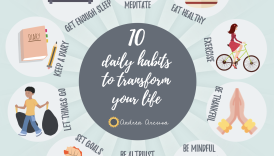Embracing a Healthier You: Practical Strategies for Life Changes

Understanding the Importance of Health and Wellness
Health and wellness are far more than just the absence of disease; they encompass a holistic approach to physical, mental, and emotional well-being. In today’s fast-paced world, taking the time to prioritize health can be a game-changer. For instance, when a busy professional decides to incorporate just 30 minutes of daily exercise, they often feel an increase in energy levels, focus, and overall happiness. Recognizing the importance of health and wellness can lead to transformative changes in one’s life, such as:
- Embracing a Healthier You: Practical Strategies for Life Changes
- Understanding the Importance of Health and Wellness
- Benefits of Embracing a Healthier Lifestyle
- Assessing Your Current Health Status
- Physical Health Evaluation
- Mental Health Check-In
- Setting Realistic Health Goals
- Identifying Areas for Improvement
- Establishing S.M.A.R.T. Goals
- Nutrition and Dietary Changes
- Importance of Balanced Nutrition
- Tips for Building a Healthy Meal Plan
- Incorporating Physical Activity into Your Routine
- Benefits of Regular Exercise
- Finding an Exercise Routine That Works for You
- Prioritizing Sleep and Stress Management
- Importance of Quality Sleep
- Strategies for Stress Management and Relaxation
- Building a Support System
- The Role of Friends and Family in Your Health Journey
- Seeking Professional Support When Needed
- Staying Consistent and Motivated
- Overcoming Obstacles and Setbacks
- Celebrating Small Victories Along the Way
- Improved immune function
- Enhanced mental clarity
- Better sleep patterns
Benefits of Embracing a Healthier Lifestyle
Embracing a healthy lifestyle offers numerous benefits that extend beyond merely looking good. People often report feeling better and more energized while managing stress more effectively. Some notable benefits include:
- Increased Longevity: A balanced lifestyle can contribute to a longer, healthier life.
- Better Mood: Regular physical activity is linked to reduced symptoms of depression and anxiety.
- Enhanced Productivity: When individuals eat well and exercise, they often see improvements in their work performance.
By understanding the importance of health and making conscious choices, anyone can set the foundation for a vibrant and fulfilling life.
Assessing Your Current Health Status
Physical Health Evaluation
Before embarking on a journey toward better health, it’s essential to assess your current physical health. This evaluation doesn’t have to be daunting; think of it as a check-in with yourself. Start by considering factors such as:
- Body Mass Index (BMI): While it isn’t the sole indicator of health, it’s a useful starting point to understand your weight relative to your height.
- Regular Exercise: Ask yourself how often you engage in physical activities. Are you meeting the recommended 150 minutes of moderate exercise per week?
By identifying areas for improvement, such as incorporating strength training or increasing cardiovascular activities, you can create a solid health baseline.
Mental Health Check-In
Equally important is assessing your mental health. Personal experiences often reveal the significance of mental wellness—a friend once confided how stress from work negatively impacted her mood and relationships. Mental health check-ins can include:
- Self-Reflection: Take a moment to evaluate how you feel emotionally. Are there recurring feelings of anxiety or sadness?
- Mindfulness Practices: Consider trying meditation or journaling to gain insights into your mental state.
By taking stock of both your physical and mental health, you set the stage for meaningful changes toward a healthier lifestyle.
Setting Realistic Health Goals
Identifying Areas for Improvement
Now that you’ve evaluated your physical and mental health, it’s time to identify specific areas for improvement. This step is crucial; focusing on what needs change can lead to a more directed approach to achieving a healthier lifestyle. Consider these questions:
- Are you getting enough sleep each night?
- How balanced is your diet? Are you consuming enough fruits and vegetables?
- What’s your current level of physical activity?
Personal experiences can be illuminating. For instance, when someone realizes they consistently skip breakfast, they might decide to prioritize meal prep on weekends to ensure they have nutritious options ready during the week.
Establishing S.M.A.R.T. Goals
Once you have identified your focus areas, it’s essential to set S.M.A.R.T. goals—Specific, Measurable, Achievable, Relevant, and Time-bound. This framework helps turn your aspirations into actionable plans. Here are examples:
- Specific: Instead of saying, “I want to eat healthier,” specify, “I will include two servings of vegetables in my lunch every day.”
- Measurable: Track your progress; you can keep a food journal or use apps to log meals.
- Achievable: Ensure the goal is realistic, like gradually increasing your exercise routine rather than jumping into daily workouts.
Setting clear, actionable goals paves the way for long-term success and fosters a sense of accomplishment along the journey to better health.
Nutrition and Dietary Changes
Importance of Balanced Nutrition
With your health goals established, focusing on nutrition is vital for achieving optimal wellness. Balanced nutrition fuels your body and can significantly affect your mood, energy, and overall health. A well-rounded diet includes:
- Fruits and Vegetables: These should be the cornerstone of any meal, providing essential vitamins and minerals.
- Lean Proteins: Sources like chicken, fish, beans, and legumes support muscle repair and growth.
- Whole Grains: Opt for quinoa, brown rice, and whole-grain bread, which offer sustained energy.
For instance, a colleague of mine made small changes by adding a colorful salad to her lunch. She quickly noticed increased energy levels throughout the day!
Tips for Building a Healthy Meal Plan
Crafting a healthy meal plan can simplify your journey toward better nutrition. Here are some practical tips to get started:
- Plan Ahead: Dedicate time each week to create a meal plan and shopping list.
- Prep Meals: Cook in batches on weekends to ensure healthy options are ready during busy weekdays.
- Incorporate Variety: Mix and match ingredients to avoid boredom—experiment with different spices and cooking methods.
By prioritizing balanced nutrition and thoughtful meal planning, you can enjoy delicious meals while staying on track with your health goals. This approach not only nourishes your body but also fosters a positive relationship with food.
Incorporating Physical Activity into Your Routine
Benefits of Regular Exercise
As you refine your nutrition, incorporating physical activity is the next essential step towards comprehensive health. Regular exercise offers myriad benefits that extend beyond just physical appearance. For example, engaging in physical activity can:
- Improve Mood: Exercise boosts the release of endorphins, often referred to as “feel-good hormones,” leading to reduced feelings of anxiety and depression.
- Enhance Energy Levels: Surprisingly, a good workout can make you feel more energetic throughout the day.
- Promote Better Sleep: Regular activity can lead to deeper, more restorative sleep sessions.
I recall when a friend started walking just 20 minutes daily; over time, she felt more energetic and less overwhelmed by daily tasks.
Finding an Exercise Routine That Works for You
Finding an enjoyable exercise routine is crucial for sustainability. Here are some tips to create a workout plan that resonates with you:
- Explore Different Activities: Try various exercises like cycling, swimming, or dance classes to discover what you enjoy most.
- Set Aside Time: Schedule workouts like important meetings to prioritize them. Consistency is key!
- Include Social Elements: Join a local fitness class or find a workout buddy for added motivation and accountability.
By blending fun and physical activity, you create a routine that supports not only your body but also your mental well-being. Embracing movement can lead to a healthier, happier lifestyle.
Prioritizing Sleep and Stress Management
Importance of Quality Sleep
With your exercise routine in motion, it’s time to turn attention to another essential pillar of health: sleep. Quality sleep plays a crucial role in your overall well-being, influencing everything from mood to metabolic health. When you prioritize sleep, you may experience:
- Improved Cognitive Function: A well-rested mind enhances focus and decision-making.
- Better Physical Health: Sleep boosts your immune system, reducing the risk of illness.
- Emotional Stability: Adequate rest helps regulate emotions, making it easier to manage stress.
I remember when I started aiming for seven to eight hours of sleep; not only did I feel sharper during the day, but my stress levels also noticeably decreased.
Strategies for Stress Management and Relaxation
With sleep addressed, it’s essential to incorporate effective stress management techniques. Here are some practical strategies to enhance relaxation:
- Mindfulness and Meditation: Set aside a few minutes daily to practice mindfulness or meditation. This can significantly improve your ability to handle stress.
- Deep Breathing Exercises: When feeling overwhelmed, take a moment to practice deep breathing—inhale for four counts, hold for four, and exhale for four.
- Limit Screen Time: Reducing time on electronic devices before bed can promote better sleep quality.
By prioritizing sleep and effectively managing stress, you’re not just enhancing your physical health—you’re fostering a balanced mental and emotional state that supports sustained well-being.
Building a Support System
The Role of Friends and Family in Your Health Journey
As you focus on prioritizing sleep and managing stress, don’t overlook the importance of a solid support system. Friends and family play a crucial role in your health journey, offering encouragement and accountability. Sharing your goals with loved ones can provide motivation and make your journey more enjoyable. For instance, when my sister joined me for morning yoga sessions, it turned into a fun ritual that we both looked forward to. Consider these ways friends and family can assist:
- Emotional Support: They can provide a listening ear during tough times, helping you feel less isolated.
- Shared Activities: Inviting loved ones to participate in healthy activities, like hiking or cooking together, can strengthen bonds while promoting health.
- Accountability Partners: A workout buddy or health-focused friend can help keep you on track by celebrating milestones and encouraging consistency.
Seeking Professional Support When Needed
While personal connections are invaluable, sometimes professional support is necessary. Nutritionists, personal trainers, and mental health professionals can provide tailored advice that meets your unique needs. Look out for signs that you might benefit from expert guidance:
- Struggling with Specific Goals: If you’re unsure how to reach your health objectives, a professional can help design a clear plan.
- Mental Health Challenges: Speaking with a therapist can offer tools to address anxiety and stress more effectively.
By cultivating both personal and professional supports, you create a comprehensive system that significantly enhances your journey toward better health and well-being.
Staying Consistent and Motivated
Overcoming Obstacles and Setbacks
As you progress on your health journey, it’s natural to encounter obstacles and setbacks—it’s part of the process. Recognizing that challenges are a normal occurrence can help you maintain motivation. For instance, I once faced a stretch where juggling work and personal commitments made it tough to stick to my exercise routine. Here are some strategies for overcoming these hurdles:
- Identify Triggers: Understanding what leads to setbacks helps you develop strategies to address them.
- Be Flexible: Adapt your goals based on current circumstances. If you can’t hit the gym, consider shorter home workouts instead.
- Stay Positive: Focus on progress rather than perfection; remember that every small effort counts.
Celebrating Small Victories Along the Way
To counterbalance obstacles, it’s essential to celebrate small victories. Acknowledging even minor achievements can boost your motivation and reinforce positive behaviors. Consider these ways to celebrate:
- Track Progress: Keep a journal of your achievements, such as consistently exercising for a week or trying new healthy recipes.
- Reward Yourself: Treat yourself to something enjoyable—maybe a new workout outfit or a relaxing spa day—when you reach a goal.
- Share Success: Celebrate with friends or family, sharing your accomplishments to inspire others and strengthen your support system.
By focusing on overcoming setbacks and celebrating victories, you pave the way for long-term success and fulfillment in your health journey.





